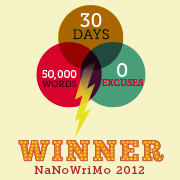Preambling Background Noise
So I’ve written two 50,000+ word manuscripts in the past year and I’m doing NaNoWriMo again in order to finish a third.
I took the first manuscript, a “new adult” angsty romance that I think mostly sucks, and set about editing it. I spent a month revising it, filling in missing pieces and making it into something that felt closer to a real book. I ended up with over 60,000 words and sent it to a friend for some feedback. Working in a vacuum sucks! So it will be good to get some feedback. Maybe it’s not as bad as I am convinced it is.
I started my second manuscript with a burst of creative energy after NaNoWriMo last year and then the world got in the way for a few months before I picked up it up again, determined to make fiction writing a habit. The second manuscript is maybe a little closer to my heart (the laws of the universe tell me this means that it’s either much better or much, much worse than the first one).
I’m working on five short romances built around a given place and theme for this year’s NaNoWriMo. It turns out I don’t like the pace of 1700-ish words a day. I am super happy with about 1,000. So I’m struggling with this fiction writing thing but not just with word count, which I’m sure I can meet so long as nothing majorly unexpected happens.
The Heart of the Matter
The simple fact of the matter is that I’ve been listening to podcasts, studying, immersing myself in the the world of self-publishing as an author because I was very fascinated by it and this all started as a lark and a strong desire to learn on my part, but now I’d like to actually do something with all these words I’ve written. I’ve dug into it and it just feels so tedious and overwhelming and a lot more like marketing than writing, so much so that I want to just go for a long walk and not write anything.
But, of course, these distractions are absurd. I’m writing because it’s pleasurable. I don’t think I’d take any pleasure in the marketing of it (at least not so far). And I don’t want to be stuck writing the same story over and over (it seems the most successful self-publishers are genre or style specific). But then I had to ask myself: What does success look like for me?
So I had to give myself a talking to and remind myself that I do have a job (that I actually like!). I am under no obligation to become a marketing professional. I make enough money to live comfortably. Ultimately, I have to focus on the craft (because I do want to write well and continue to improve and I’ve already given myself permission to suck in order to learn from it) and forget the rest.
I think the real problem is that I’ve been making the craft of writing itself secondary to the business of self-publishing. It seems lots of self-published writers are treating writing as a kind of sport–a race–that they are working on in order to improve their time and their bottom line and they assume that volume will eventually lead to quality.
So I’m stuffing all my self-doubts and going back to focusing on the quiet joys of story and structure.
I’m also giving myself permission to suck at marketing.

